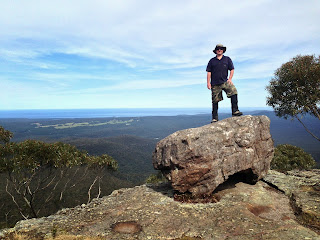The reason why talking about mental distress (also known as mental illness but I use distress as it includes more people than what a diagnoses does and does not have the stigma attached as the word illness; it implies a fully human experience) in the Asperger's community is that various studies have shown that as many as 70% of people with Asperger's also have a mental illness, most commonly depression and anxiety although there is likely a higher percentage of people that have autism also have schizophrenia and bipolar.
I went to a workshop in the week about which was titled "Navigating mental distress, supporting the personal journey of recovery". The pilot program is run by inside out & associates Australia (
http://www.insideoutconversations.com.au/).
The workshop was about how the traditional method of treating mental illness is to solely use a medical approach to treat people with a mental illness creates stigma, leaves patients dis-empowered as they were dictated to by health professionals and were not in control of their own treatment. The seminar also explains how we need to move away from this, and let individuals take control by asking what they want/need, helping them reach the goals that they want to achieve, empowering the individual by handing back control to them and making them feel valuable by allowing them to be part of their own improvement.
The way we look at mental disorders need to go from being medical to being focused on the individual and looking at the distress as a wholly individual experience and treating the person as a person, not treating them as a "someone who is mentally diseased".
The seminar was on a recovery-oriented mental health services. Recovery is defined as ‘being able to create and live a meaningful and contributing life in a community of choice with or without the presence of mental health issues’.
Recovery-oriented approaches offer a transformative conceptual framework for practice,
culture and service delivery in mental health service provision. The lived experience and insights of people with mental health issues and their families are at the heart of recovery-oriented culture. The concept of recovery was conceived by, and for, people living with mental health issues to describe their own experiences and journeys and to affirm personal identity beyond the constraints of their diagnoses.
Recovery-oriented approaches recognise the value of this lived experience and bring it together with the expertise, knowledge and skills of mental health practitioners, many of whom have experienced mental illness in their own lives or in their close relationships. Recovery approaches challenge traditional notions of professional power and expertise by helping to break down the conventional demarcation between consumers and staff. Within recovery paradigms all people are respected for the experience, expertise and strengths they contribute.
Recovery-oriented approaches focus on the needs of people who use services rather than on
organisational priorities.
More information about recovery can be found here (these are also the source for part of this blog post)
http://www.ahmac.gov.au/cms_documents/National%20Mental%20Health%20Recovery%20Framework%202013-Policy&theory.PDF
http://www.mentalhealth.org.nz/file/downloads/pdf/Destination%20Recovery_FINAL_low%20res.pdf
I am in agreeance with this approach and believe that it will help alot more people have better outcomes. This is a great start for people with an Autistic Spectrum Condition however, as there are quite a number of differences between non-autistic and autistic people such as the difficulties of recognising their own and others emotions, we often appear to lack empathy however the opposite is often the case that we feel very strong emotion which often confuses and overwhelms us.
As I have not found a lot of information I would like to get some thoughts from you on what I should put in my next post which will focus on what people with Asperger's need to cater for their specific needs in the way with dealing with co-morbid conditions, especially anxiety and depression, but any suggestions on this topic are more than welcome.
Thank-you for reading my blog and if you like my work please support it by giving it a plus1, sharing it on facebook and twitter. If you want to you can follow me on twitter (@AutismOrangeAus).Stay tuned for the next update.







.jpg)





